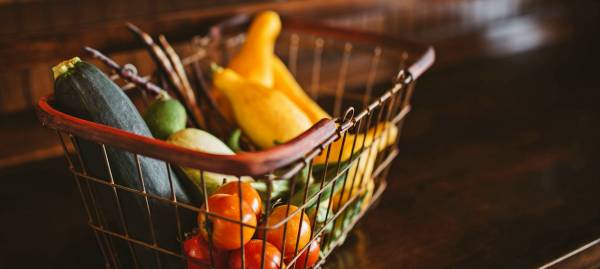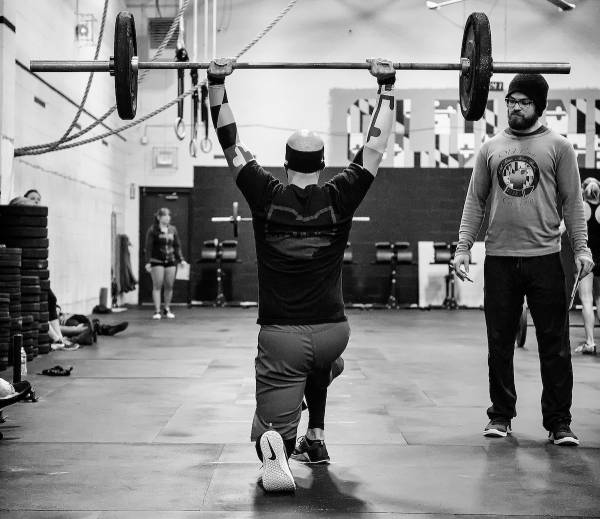(Source: Bev Childress)
It’s a funny time of year, if you’re a CrossFitter. All day Thursday (or Friday, depending on where you live) is filled with trepidation and a bit of a cold sweat, wondering what will be in store for us in the next Open workout.
The CrossFit Open is five weeks of worldwide competition, where every CrossFit athlete in the world can compete in the same workout. For some, it will be an effort to rank high enough to be invited to Regionals, and if you’re good enough, to go to the Games. But for most of the other half million or so participants, it’s an opportunity to gauge yourself and your fitness against the world.
Even if you’re not obsessively refreshing the Leaderboard for the next month like the rest of us, there’s value to be gained from what I’m about to say. There’s a plethora of advice out there about how to prepare for the Open, and no small amount of it is geared toward nutrition. A central theme of this advice is that it’s time to start eating clean. To be ready for the Open, it seems, you must get rid of alcohol and junk food, and immediately begin eating only whole foods. Maybe even go strict paleo.
But if you aren’t already doing those things, now is not the time to make wholesale changes to your diet. Here’s why.
Unintended Consequences
When most people start to “eat clean,” they tend to avoid starchy foods, and switch to leaner, less carb-dense choices like vegetables and sweet potatoes. The weekly pizza nights are out, and high-calorie evening snacks are replaced with celery sticks.
This is a brilliant strategy for weight loss, but why is that? Because you’ve suddenly created a huge calorie deficit. A deficit is fine if our goal is improved body composition, but it comes at the expense of optimal performance, recovery, and gains in strength. Does that sound like a winning strategy for the Open?
And these unintended consequences hold true for people in any training environment, as well. If you’re happy to just lose weight and not worry so much about strength and performance, a calorie deficit is the place to be. But if you want to recover optimally and grow muscle, the opposite is true. If your training regimen requires high performance, suddenly removing the easiest and most efficient sources of energy (grains, starches, and other carbs) isn’t going to help you.
Competition Nutrition
For CrossFit athletes, the start of the Open brings with it a switch from training to competing. Even if you harbor no illusions of going to the Games, doing an Open workout is a lot more competitive than the daily WOD you do every other time of year. You’re being judged by one person, and all your mates are around you doing the same. Spectators are watching you and shouting your name. It all adds up to an atmosphere that takes over, and you naturally push to 100%.

At the end of it, our muscles and central nervous system are crushed by the sudden increase in intensity, and the unusual challenges brought by most Open workouts. We find ourselves getting intimately familiar with our little patch of the gym floor. At this point, your body is destroyed, and it desperately needs calories (and carbs) to rebuild. Because after all, next week you have to do it all again.
Simply put, recovery and performance do not happen in a calorie deficit. Carbs are a necessary part of recovery; vital to restore blood sugar and drive nutrients to our muscles. Without carbs, we limit the amount of glucose available for our workouts, and instead tap into less efficient fuel sources, such as body fat and muscle protein.
This isn’t to say you should throw caution to the wind and eat all the junk food you like before the clock starts! What I am saying is that a Snickers before bed might just be the few additional carbs you need to perform your best the next day. Eating clean has a time and a place, and most times of year it’s fine to think twice about that bowl of ice cream. But during the Open is not that time.
Fuel For Your Goal
The perfect time to clean up your diet and address your body composition was some time after last year’s Open. Then, all those carbs you piled on through the holidays would have been part of a natural building phase for this year’s Open. But if you’ve waited until now to try and go paleo, you may as well wait a few more weeks until you’re out of competition again.

(Source: J Perez Imagery>)
It is absolutely desirable to fuel your competition with clean, whole foods. But the transition to a stricter diet almost always comes with an unintentional decrease in calories, and that means you won’t be giving your body the fuel it needs to perform these next few weeks. Keep an eye on your goals, and realistically assess whether you’re in a calorie surplus or a deficit. You can’t have it both ways; either you’re fueling for strength and performance, or you’re cutting for body composition and weight loss.
It’s your choice. So what do you say, want to charge up for the next Open workout?
Need to know how to refuel?






